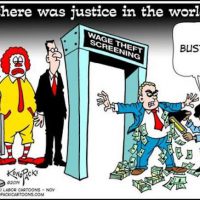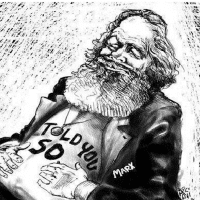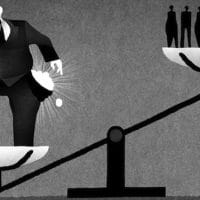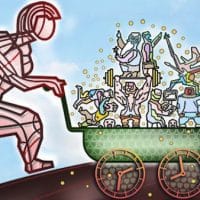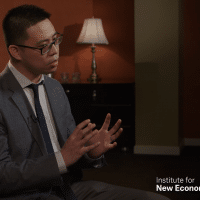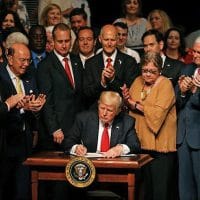-
Two billion dollars in stolen wages were recovered for workers in 2015 and 2016—and that’s just a drop in the bucket
The last four decades have been marked by rising wage inequality, with the vast majority of American workers experiencing wage stagnation while those at the top rung of the economic ladder reap the benefits of growth in productivity. These dynamics mean that many workers struggle to make ends meet; in 2016 one in five families in which at least one person worked were living below 200 percent of the federal poverty line (U.S. Census Bureau 2017).
-
Taxes, inequality, and class power
No doubt about it, the recently passed tax bill is terrible for working people. But as Lance Taylor states in a blog post titled “Why Stopping Tax ‘Reform’ Won’t Stop Inequality”: “Inequality isn’t driven by taxes—its driven by the power of capital in relation to workers.” Said differently we need to concentrate our efforts on shifting the balance of class power. And that means, among other things, putting more of our energy into workplace organizing and revitalizing the trade union movement.
-
Review of Art and Value by Dr. Nizan Shaked
Art and Value: Art’s Economic Exceptionalism in Classical, Neoclassical and Marxist Economics reveals the irreconcilable differences between the Marxist economic definition of the term ‘value’ and its other uses in relation to the art object. It corrects the faulty assumption that rare or historical objects bear intrinsic value, symptomatic of capitalist worldview. Beech’s analysis of art’s value-form is critical to unpacking the double ontological condition of art as both an object of collective symbolic value and a hoard of monetary value, since the two operate in mutually exclusive spheres, yet function to constitute one another. The book can help us understand the capitalist sleight of hand that allows art to flicker between two forms of being, making profit appear as value, and value appear as significance (and vice versa), the toggling between the two facilitating the transfer of commonly held symbolic value in support of the individual accumulation of wealth.
-
Just say no to NAFTA
The North American Free Trade Agreement (NAFTA) is unpopular with many working people in the United States, who correctly blame it for encouraging capital flight, job losses, deindustrialization, and wage suppression.
-
Marxian economics
This entry begins by setting out the core ideas of Karl Marx (1818–83), with particular reference to the theory of historical materialism and its application to the capitalist mode of production. Marx’s theory of value and distribution receives detailed attention, followed by his models of capital accumulation and economic crisis.
-
Tax cuts: It’s all about capitalism
Powerful corporations and the rich in the United States continue their winning ways. By narrow margins, both the House of Representatives and Senate have agreed on a budget proposal that calls for an increase in the federal deficit of $1.5 trillion dollars in order to fund a major reform of the U.S. tax system that will make the rich and powerful even more so.
-
This year’s real Halloween horror
The Mars family has made billions selling us M&Ms, Snickers, and countless other Halloween treats for a century now. But when it comes to paying tax, the Mars family seems to be all tricks and no treats.
-
Laughter is the best medicine
Only mainstream macroeconomists could possibly have thought that capitalism is self stabilizing. The rest of us—who have read Marx and Keynes…—actually knew something about the roots of capitalist instability.
-
Dimensions of economic power: today’s key corporations
The images below are from a lecture I gave to at SOAS, London University, on 18 October. This was part of a series organised by the SOAS Economics Department, and my lecture covered the forms taken by corporate power today, focusing on Apple, Google/Alphabet, Facebook, Amazon and Alibaba.
-
Richard York in Mauritius discussing the Anthropocene and ecological rift
A capitalist system cannot aim at responsible production that will reduce the negative impact on our future, and this is why we need a system change! This was the main theme of the second presentation of the day, done by Richard York. He exposed this concept through 6 different perspectives.
-
Top ten percent now own 77% of the wealth
The Federal Reserve released the 2016 version of the Survey of Consumer Finances today. I will be doing a lot of work with this data in the coming months. But for starters, here is a short post about overall wealth inequality.
-
The difficult art of being a feminist in an economist classroom
It’s high time that we replace the narrow rational economic man within our models with a more objective understanding of human nature by incorporating the ‘feminine’ characteristics of humanism, connectedness, and intuition.
-
Why exports alone can’t make poor countries rich
In a world composed of global value chains, headline global trade data can mask the truth about how much exports are actually benefiting a country, according to professor Xiao Jiang from Denison University.
-
The hidden environmental impacts of “platform capitalism”
New technological platforms like Uber are promising to reshape society: but what is the impact for people and the world we live in? What does this mean for our environment?
-
Amazon: becoming the market
Amazon is an unusual company. With a market capitalization hitting $500bn at the end of July and no profit to show, it is not a company trying to be a part of the market, it is trying to become the market.
-
Unions fight inequality
The decline in unionization is one of the most important factors promoting the concentration of income at the upper end of the income distribution. The statement may not surprise you, but the fact that this was the conclusion of an IMF study of the causes of inequality might.
-
Social Security may bust the Federal budget – but not how you think
Both Democrats and Republicans have used social security funds to hide government debt—i.e., to trick the public. This was made possible by a huge surplus engineered by fund actuaries to account for baby boomers. In the next few years the fund will need to cash in on its bonds and this will cause the federal debt to balloon.
-
Venezuela: ‘our revolutionary democratic experience is at stake’
Revolutionary activist and sociologist Reinaldo Iturriza has spent many years working with popular movements in Venezuela and writing on the rise of Chavismo as a political movement of the poor. He also served as Minister for the Communes and Social Movements, and then Minister for Culture in President Nicolas Maduro’s cabinet between 2013 and 2016.
-
Secular Stagnation
The fundamental changes I would advocate are those that would: dramatically boost worker power; secure a progressive and growing funding base for a needed expansion of public housing and infrastructure and public spending on health care, education, and transportation; and end the production and use of fossil fuels and significantly reduce greenhouse emissions.
-
US Cuba policy has been hijacked by Cuban-Americans
US policy toward Cuba (Trump reverses Obama’s Cuba deal, limiting travel and trade, 17 June) has been hijacked by a clique of Cuban-American politicians, who have sold their support in Congress to President Donald Trump. Above all, these individuals – and Trump – have demonstrated the corrupt and clientelist nature of the US political system. Can such a system serve as a symbol of “freedom” to anyone in the world?

